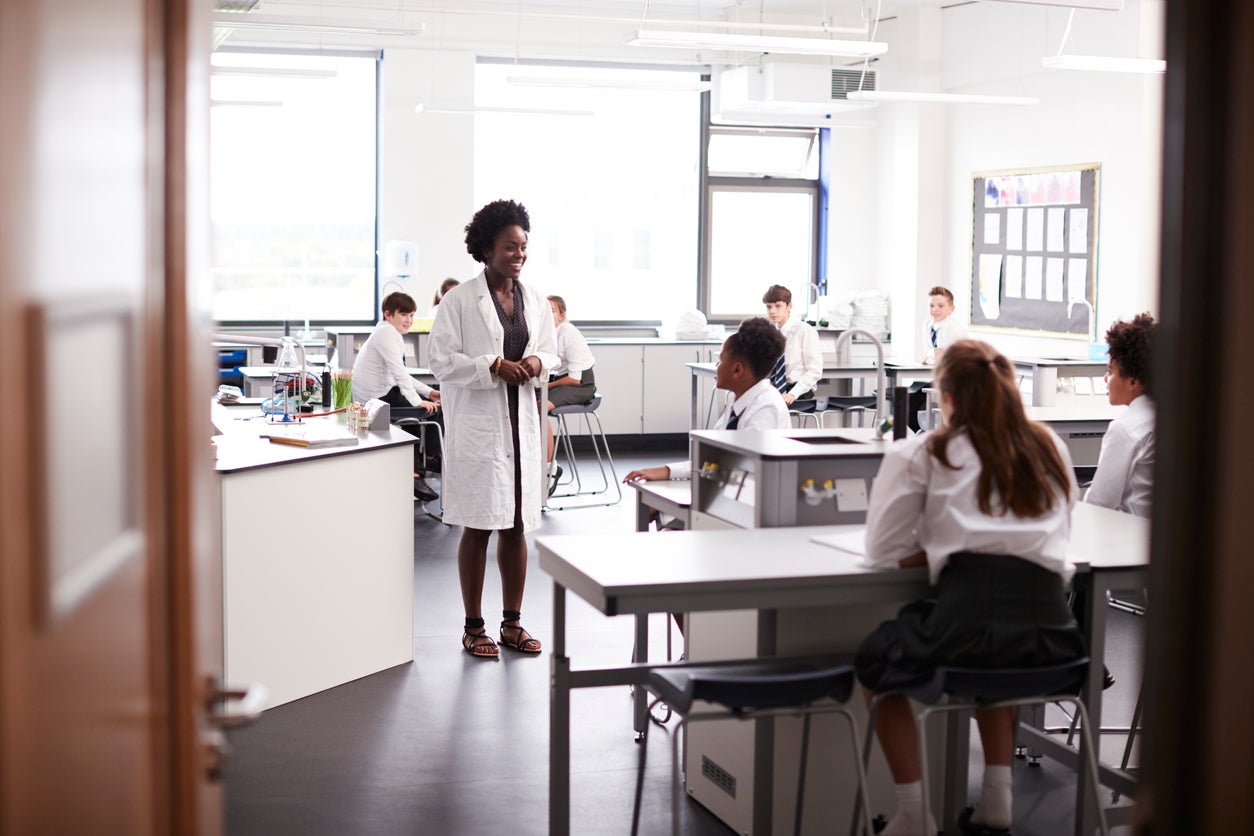The only thing keeping teachers going is the resilience and drive of our students
One day things will return to normal for us all – until then, have faith that our students are capable of achieving so much, no matter how strange things may seem, writes Supritha Rao


I have been trying to find the right word to sum up this school term. The one I keep returning to, however, is “strange”. Did I ever imagine I would be confined to one corner of my classroom, not allowed to approach the children I teach? Did I ever imagine I would need to wear gloves, visor and mask to teach the basics of computer programming? Yes, it has certainly been a strange start to the academic year.
And all this after a very strange 2020 overall. When lockdown started, and we had to switch very quickly to working from home and delivering lessons remotely, little did we expect that so many other aspects of the profession would change. Not only are we now helping our students catch up after so much time out of school, we have the added pressure of accelerating this school year in order to mitigate further lockdowns and ensure assessments are completed to maintain confidence in next year’s GCSE and A-level results.
I’m sure I won’t be the only teacher craving even just a day of normality. For the foreseeable future, though, strange is the new normal. That said, throughout all of this, the most remarkable thing has been the children. For all we may complain about PPE, social distancing and corridor patrol, the impact on students has been massive.
I worry about their mental health and wellbeing, particularly my year 7 students, who have had the transition from primary to secondary made even tougher by lockdown and Covid safety measures. I worry that not being able to walk around my classroom means I cannot deal with challenging behaviour in the way I would like. I worry that a quiet student, who lacks the confidence to speak up and ask for help, misses out because I cannot now crouch at their side and speak to them one on one. I worry I cannot deliver the same level of fun and creativity for my classes because of social distancing measures. And yet, every day throughout lockdown and into this new year, my students’ resilience has astounded me and spurred me on.
Before lockdown last year, I had incorporated the Longitude Explorer Prize into my lessons. The nationwide prize calls on key stage 3 and 4 students to use the Stem lessons they learn in school and put them into practice to create real-world solutions to big challenges, such as climate change, healthy living, cleaner transport and the ageing population.
Five of my students – Lilia, Kathryn, Sophie, Eeman and Basira – formed a team and came up with the concept of a smartwatch app for people with dementia to help them live independently. It is called TOMADACHI (meaning “friend” in Japanese). It was all going well and they made it to the semi-finals, then the pandemic struck, school closed and strict social distancing came into force.
It might have been the end of TOMADACHI. However, the girls were not going to be stopped by a bit of home-working. They forged ahead, driven by their passion for using their tech knowhow to make a positive impact, and motivated by the new skills they were learning.
Not only did they develop the app, design it, code it, work with an industry mentor to refine the product and solve the problems they came up against, they went on to win the entire competition. That’s no mean feat at the best of times; during lockdown, it was astounding. In fact, as we found out later, they were not the only ones working hard through lockdown – of the 40 finalist teams in the competition, only four had to withdraw.
It was a real eye-opener for the students. It took them beyond textbooks, beyond the classroom, to get a taste for life outside school and in industry. It encouraged them to push themselves and take responsibility for their learning. It was a real eye-opener for me, too, to see my lessons being put into practice so positively.
The thing I noticed most, though, was the resilience the girls developed, working as a team, overcoming the obstacles they faced in developing their app, solving problems and of course contending with remote digital working. Most adults would find it difficult to do what they did; that they are teenagers makes it even more remarkable.
So yes, these are strange, very strange times we live in. If I’d predicted this time last year what was in store for us all, I’d have been laughed out of the room. Who knows what surprises the next year has in store for us all. It’s going to be trying; there will be difficult periods, and there will be frustrations. But if Lilia, Kathryn, Sophie, Eeman and Basira could create and code an award-winning app, all while working from home, all while carrying on with the rest of their work, then I will take inspiration from their resilience and drive.
One day things will return to normal for us all. Until then, have faith that our students are capable of achieving so much, no matter how strange things may seem.
Supritha Rao is a computer science teacher at Greenford High School in west London
In July 2020, Team Iscort won the Longitude Explorer Prize with TOMADACHI – a smartwatch app to support people with dementia and memory loss
The prize returns this year as the Amazon Longitude Explorer Prize and £40,000 will be awarded to winning schools and youth groups. Applications close on 12 February 2021. For more information, visit longitudeexplorer.challenges.org




Join our commenting forum
Join thought-provoking conversations, follow other Independent readers and see their replies
Comments